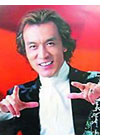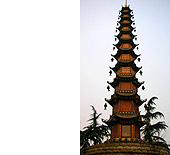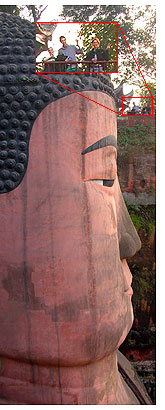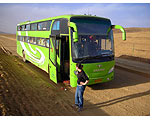« December 2005 | HOME PAGE | February 2006 »
January 23, 2006
Three Gorges Photos
 As promised, here are the photos from my trip earlier this month along the Yangzi River. Along the way I passed through the Major, Minor, and Mini Three Gorges, as well as the massive Three Gorges Dam project. Many of the pics are extremely gray, as central China is almost always covered with dense fog in the winter months. Nonetheless, I hope the photos accurately portray what I saw over the course of three days and nights spent on a vermin-infested "cruise" ship.
As promised, here are the photos from my trip earlier this month along the Yangzi River. Along the way I passed through the Major, Minor, and Mini Three Gorges, as well as the massive Three Gorges Dam project. Many of the pics are extremely gray, as central China is almost always covered with dense fog in the winter months. Nonetheless, I hope the photos accurately portray what I saw over the course of three days and nights spent on a vermin-infested "cruise" ship.
As a reminder to everyone, I also direct you to the main gallery page, where you can browse through tons and tons of photos. Those of you who only click on the links I post on this main page may have missed something over the past year.
posted January 23, 2006 at 12:36 AM unofficial Xinjiang time | Comments (19)
January 22, 2006
The King of CCTV
 There's an article in today's New York Times about Li Yong, host of CCTV's Spring Festival gala spectacular. For those of you unfamiliar with the program, it's a crazy variety show broadcast once a year in China to celebrate the Lunar New Year. It somehow manages to compress everything that's horrible about Chinese television into a snappy four-hours. That said, you can't not watch it, and even if you tried you'd still be forced to see replays of the program's highlights for the rest of the year.
There's an article in today's New York Times about Li Yong, host of CCTV's Spring Festival gala spectacular. For those of you unfamiliar with the program, it's a crazy variety show broadcast once a year in China to celebrate the Lunar New Year. It somehow manages to compress everything that's horrible about Chinese television into a snappy four-hours. That said, you can't not watch it, and even if you tried you'd still be forced to see replays of the program's highlights for the rest of the year.
The article touches on changes happening in the Chinese TV market (fragmentation, etc.), but the big surprise for me is that Li Yong turns out to be a Xinjiang boy. Not that he seems to have very fond memories:
He had never imagined himself a television celebrity, growing up in the remote western region of Xinjiang. His parents had moved there to heed the "patriotic call" from the party to develop the west. Mr. Li said his fondest childhood wish was to get away.
As always, you can read the full article by clicking below.
A TV 'King' Pushes the Limits, Flashily but Gently
January 21, 2006
The New York Times
By JIM YARDLEY
Beijing
THE third floor of the fashionable coffee shop is empty, so when Li Yong reaches the top of the staircase and steps onto the landing, his entrance is greeted with silence. But Mr. Li, a popular television host known for his flamboyant style, makes an entrance, nonetheless.
He is dressed in a black leather jacket with studded metal shoulders matched by studded leather pants. His white boots are faux alligator skin. His fingernails shimmer with translucent white polish. His famously flowing mane of brown hair is streaked with gold highlights. He is not your typical Beijing coffee shop patron.
"I've just come from a fitting," he offered by way of explanation as he dropped into a large red chair, seeming a bit tired.
In recent days, Mr. Li, 37, has juggled rehearsals, fittings and other demands as he prepares for the annual Spring Festival Gala, the four-hour-plus variety show to be broadcast next Saturday. The program, perennially one of the world's most-watched shows, falls on the eve of the Lunar New Year holiday, when Chinese families get together to eat dumplings and, not always gleefully, watch the gala. Indeed, complaining about the show - with its blend of comedy, singing, dancing and propaganda - is as much a tradition as watching it.
Mr. Li, one of the program's four hosts, is aware of the complaints, just as he understands that the exposure he gets is the Chinese equivalent of being host of the Academy Awards. "There are more than 500 hosts and hostesses on CCTV," he said. "Each of them wants to be part of the gala. I'm very honored to be chosen."
Known for his theatrical gestures, his exuberant style and his slightly unorthodox looks (to put it politely, not everyone thinks he is handsome), Mr. Li is considered one of the most popular and bankable stars among a stable of more subdued personalities at China Central Television, or CCTV, the central government's television network. One study publicized by state media - though not independently verified - declared that Mr. Li was the most valuable host in China, with a projected annual value of $50.8 million to CCTV.
As a Communist Party member and an employee of one of the party's leading propaganda organs, Mr. Li has a job description that differs from Jay Leno's. The nightly monologue in which Mr. Leno skewers political figures like President Bush would be career suicide for Mr. Li, given that the Chinese media are strictly forbidden to criticize top leaders.
But within the confines of what is permissible on the entertainment side of state television, Mr. Li thinks himself a bit of a rebel. He uses a trademark punching gesture on one game show while on another he has taken to flicking away question cards in Lettermanesque fashion. He sometimes speaks with bits of slang even though censors forbid hosts from using the Hong Kong or Taiwanese accents that are popular with Chinese youth.
"I don't talk in slogans," he said. "I don't distinguish the stage from life. My habits and flaws come out on the stage."
MR. LI'S appeal also reflects a new reality for CCTV, namely that public opinion matters. If CCTV was once virtually unchallenged, the rise of provincial, local and Hong Kong-based television channels has steadily splintered market share in entertainment shows.
Last November, CCTV failed to meet its revenue goals in its auction of advertising rights for 2006. Meanwhile, a provincial station produced the top hit of 2005, a knockoff of "American Idol" known as "Super Girls" that became so wildly popular that CCTV reportedly schemed to undermine it.
Mr. Li was drawn into the controversy because one of his programs, "Dream of China," was considered CCTV's counterpunch, a point he denies. But the fact that CCTV apparently considered Mr. Li the network's best weapon only underscored his importance.
His big break came in 1998 when he was host of a game show called "Lucky 52." He had never imagined himself a television celebrity, growing up in the remote western region of Xinjiang. His parents had moved there to heed the "patriotic call" from the party to develop the west. Mr. Li said his fondest childhood wish was to get away. "I just wanted to get away from parents and family, have an independent life and do as I pleased," he recalled.
His chance came when he enrolled at the Communication University of China in Beijing. He graduated in the early 1990's, when the competition for jobs was less fierce than it has become, and was assigned a job at CCTV. He worked on the news side as a reporter and producer, but it was his shift to entertainment that made him famous.
He said his style on "Lucky 52" - his sweeping hair, his stylized attire and his loose on-air demeanor - was so unorthodox that scholars invited him to attend a conference to discuss whether he should be encouraged or if the show should be canceled. But these days, many commentators have come to see his style as far preferable to that of hosts who seem to be stiffly reciting memorized lines.
"The concept of hosting has changed," said Wang Xiaofang, a prominent journalist who covers the entertainment industry. "Now the audience expects to see brains, technique and charm."
Mr. Li is still the host of "Lucky 52," as well as two other programs. He said he had sometimes studied British game shows but did not actually watch much television. He lives in one of the fashionable apartment developments in downtown Beijing with his wife and their 3-year-old daughter. His wife, a college sweetheart, is a CCTV producer who is often credited in helping her husband's rise.
The foibles of China's television and movie stars feed the growing corps of paparazzi, but Mr. Li and other CCTV stars are expected to keep a relatively low profile. He reportedly bristled over articles about his Porsche. He was also once scolded in the news media after he was photographed smoking in public, a habit shared by most men in China. (At the coffee house, he happily smoked a Cuban cigar.)
THIS will be the fifth consecutive year that Mr. Li has been a host for the Spring Festival Gala. When it started in 1983, the show attracted almost every person with a television set. But with growing competition and changing public tastes, it has steadily lost viewers, even though it still is believed to have an audience of a few hundred million people. Often, the show is playing in Chinese households, even if no one is watching.
Producers, eager to attract younger viewers, have signed up popular singers in recent years. But Mr. Li emphasized that the show also had political, social and cultural "responsibilities," given that it is expected to announce the government's theme for the year. For 2006, it is harmony, a reflection of President Hu Jintao's call for a "harmonious society."
Mr. Li said his role on the program was that of a tailor, stitching one performance to another. By comparison, "on my own programs, I am a king," he said, laughing at his own joke.
Even a king, though, faces limitations on Chinese television.
He said he had tried out a new gesture to match his trademark punch - blowing kisses. But so far, it has always ended up on the editing room floor.
"Blowing kisses," he said, "is not as easily accepted as the punch."
posted January 22, 2006 at 12:06 AM unofficial Xinjiang time | Comments (27)
January 20, 2006
Sichuan Photos
 It's time for me to reveal some more photos from my recent trip. This time I've put together fifteen photos from a few days spent both in Chengdu and at the nearby Leshan Giant Buddha. Enjoy... but remember to stay tuned-in over the next few days, as I'll be uploading photos from my Yangzi River trip through the Three Gorges as soon as possible.
It's time for me to reveal some more photos from my recent trip. This time I've put together fifteen photos from a few days spent both in Chengdu and at the nearby Leshan Giant Buddha. Enjoy... but remember to stay tuned-in over the next few days, as I'll be uploading photos from my Yangzi River trip through the Three Gorges as soon as possible.
posted January 20, 2006 at 02:59 PM unofficial Xinjiang time | Comments (14)
January 19, 2006
Guess Who's Back?
Alright. Tired of guessing? It's me. I'm back at my parents' home in New Jersey, so if you're interested in getting together why don't you send me an email? I should be popping up here and there in various parts of the lower 48 states over the next four to six weeks (more or less). Then it's back to China with me, most likely Beijing. So, catch me while you can!
posted January 19, 2006 at 08:19 AM unofficial Xinjiang time | Comments (12)
January 10, 2006
Leshan Giant Buddha and Beyond...
 Took a day-trip a couple of hours south from Chengdu today to the Giant Buddha at Leshan... it's the world's biggest statue of the Buddha, seventy-one meters tall for those of you who are measuring. It was quite an impressive way to end my travels around the Chengdu area. To get an idea of the scale, take a look at this image I snapped of the Giant Buddha's head... the little flecks highlighted just to the right of his forehead are Rachel, Chris, and Camilla.
Took a day-trip a couple of hours south from Chengdu today to the Giant Buddha at Leshan... it's the world's biggest statue of the Buddha, seventy-one meters tall for those of you who are measuring. It was quite an impressive way to end my travels around the Chengdu area. To get an idea of the scale, take a look at this image I snapped of the Giant Buddha's head... the little flecks highlighted just to the right of his forehead are Rachel, Chris, and Camilla.
In other news, I've finalized plans for the rest of my time in China before heading back to the land of the free and the home of the brave. I've decided - despite some reservations that it might not be that impressive - that I'll be taking a river cruise down the Yangzi River (Chang Jiang) from Chongqing through the Three Gorges and on to Yichang in Hubei Province. I figure that I had better see it before the massive Three Gorges Dam is completed in a few years. A bus will pick me up early tomorrow morning at the Traffic Hotel here in Chengdu, take me to Chongqing for a half-day tour, and put me on a boat in the afternoon. I should arrive in Yichang sometime before dawn on the 14th... from there I'll make my way to Beijing, arriving on the 15th. A few days in Beijing will include my much-hyped job interview, and then I'll be home on the 19th. So, see you soon...
posted January 10, 2006 at 08:50 PM unofficial Xinjiang time | Comments (23)
January 08, 2006
Labrang Photos
I know that all of you love to see new photos. So, with that in mind I've worked extra hard to upload a set of photos from my trip to the Labrang Monastery as quickly as humanly possible. Enjoy!
posted January 08, 2006 at 05:36 PM unofficial Xinjiang time | Comments (15)
Xiahe to Chengdu
 They said it couldn't be done, but here I am in Chengdu... and less than 24 hours after leaving Xiahe! In China, such a feat is on par with the building of the Great Wall and the launch of Shenzhou 6. How did I get here so quickly? Only luck could bestow such extreme time savings on the group of weary travellers with which I travel.
They said it couldn't be done, but here I am in Chengdu... and less than 24 hours after leaving Xiahe! In China, such a feat is on par with the building of the Great Wall and the launch of Shenzhou 6. How did I get here so quickly? Only luck could bestow such extreme time savings on the group of weary travellers with which I travel.
Our original plan had been to get to Chengdu via Zoige and Songpan, which most likely would have taken 2 or 3 days. With that in mind, we awoke before dawn on Saturday morning and took a taxi out to the highway, where we lay in wait to flag down a passing bus. We began to become disheartened when after waiting for an hour or so, the bus we were looking for hadn't shown up. Then...BAM! A bus (see photo) that was coming from Lhasa and heading to Chengdu showed up out of nowhere, and the four of us scrambled aboard.
The conditions on the bus were dirty to say the least, as it had been on the road already for five days and was filled with discarded orange peels and cigarette butts. The bus broke down quite often as well... something wrong with the idle would be my non-technical explanation. Yet we made it alive to Chengdu this morning, more than a day ahead of schedule. Now I'm ready to gorge myself on the fiery delights of Sichuanese cuisine!
posted January 08, 2006 at 10:27 AM unofficial Xinjiang time | Comments (33)
January 05, 2006
Labrang Monastery
UPDATE: The photos from Labrang Monastery can be found here.
Greetings from Xiahe in Gansu Province, home of the Labrang Monastery (Laboleng Si). At this very moment, I sit in an Internet cafe full of Tibetan lamas. Chris, Rachel, Camilla and I arrived here this afternoon after a 36-hour train from Korla to Lanzhou, followed by a 7-hour bus ride southwest to Xiahe. Good scenery... but a bit too long to travel in a single stretch. We only had time to walk around the monastery for a short time this evening before the sun went down and temperatures became too cold to bear. But... tomorrow's another day and I plan to wake up at 6 a.m. to catch the monks in action. This is my first experience in a completely Tibetan area, and needless to say everything is fresh, exciting, and new.
Questions for the near future: Will we see a sky burial tomorrow morning? How long will it take us to work our way through the mountains to the south and into Sichuan? Will we make it to anywhere beyond Chengdu, or will that be the end of the journey? How will my interview in Beijing go?
The answer: I'll let you know.
posted January 05, 2006 at 06:41 PM unofficial Xinjiang time | Comments (21)
